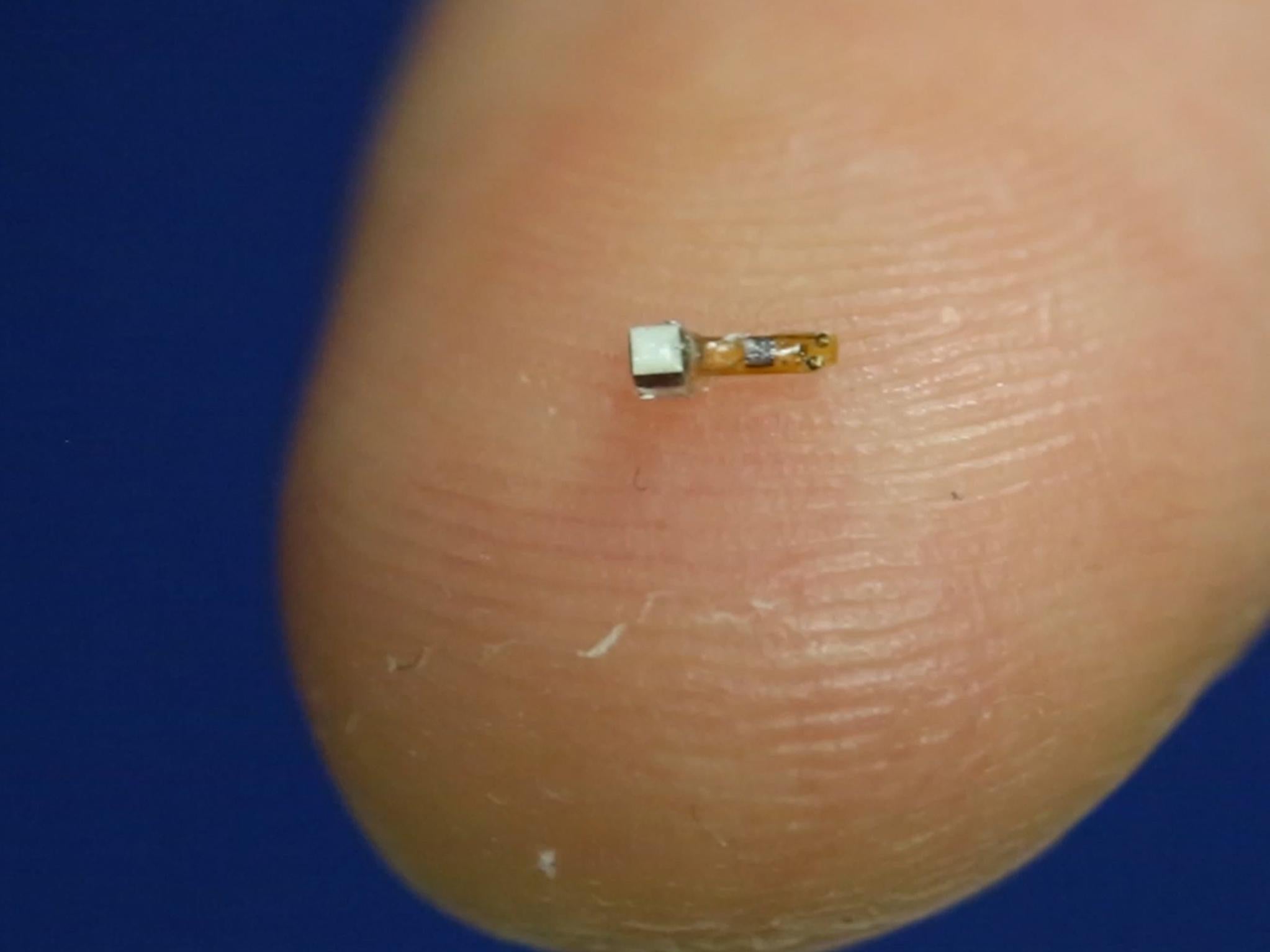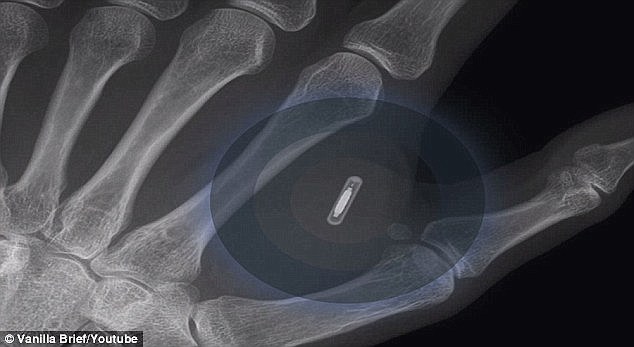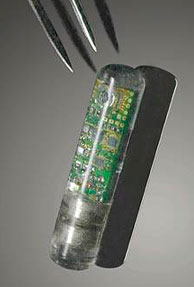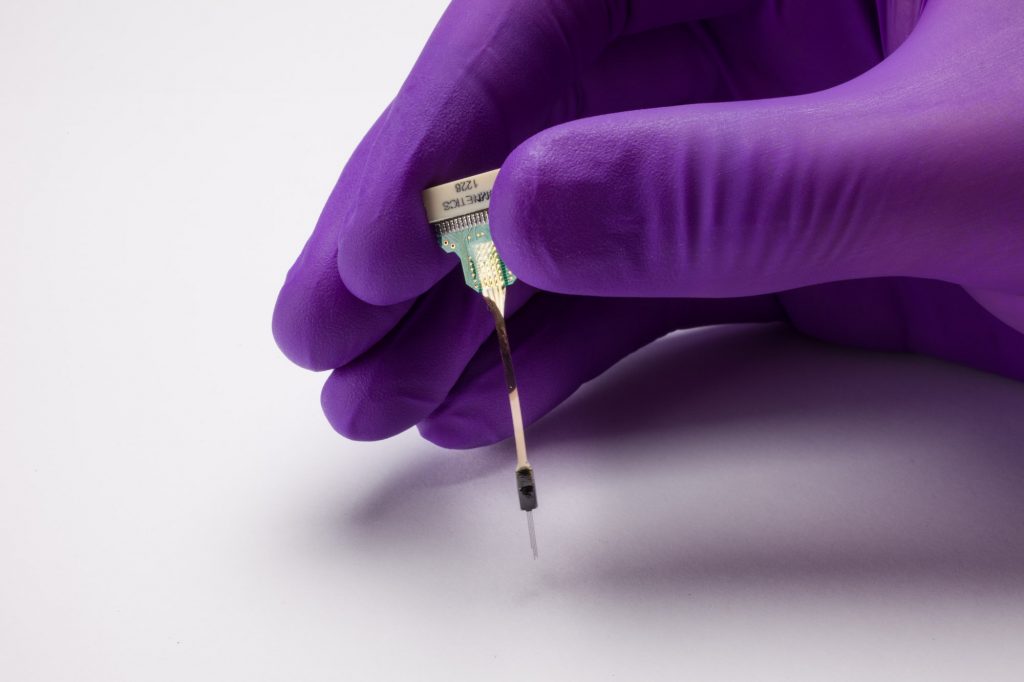BIO CHIPS/IMPLANTS
tag, track and trace



THOUGHT EXPERIMENT
is the ULTIMATE goal
universal mandatory vaccination for covid 19,
or --- is it actually something else
having to do with frat boy pipe dreams
regarding medical nanotechnology ?
ARE YOU/WE BEING CONDITIONED
TO ACCEPT MASS INJECTIONS
ON A REGULAR BASIS =
INJECTABLE COMPUTERS ?
WUHAN
HONG KONG
and
SHANGHAI
ccp methodologies
WANT TO BRING IT TO YOU, NEXT !!
BY MEANS OF UNITED NATIONS TREATY WITH U.S.
APPEARS TO BE COMING YOUR WAY SOON !!
FLASHBACK: Pfizer CEO at Davos Brags About New Pill with Chip That Will Send Signal to Authorities that It’s Been Ingested
and
https://forsided.com/2022/05/23/pfizer-ceo-suggests-microchip-pills-to-davos-group-video/
Pfizer CEO Albert Bourla impressed the audience at the World Economic Forum in Davos this week with thoughts of ingestible computer chips that notify authorities when a medicine has been digested. Probably, he may have forgotten he was on camera.
it is a, basically biological chip that is in the tablet. And once we take the tablet and dissolves into the stomach, sends a signal that you took the table. So imagine the applications of that – the compliance. The insurance companies know that the medicines patients should take, they take them.
Pfizer’s defenders joined in, suggesting that Bourla’s futuristic pitch could be used in “specific” conditions such as “schizophrenia and cancers” to ensure compliance.
___
!World Economic Forum shill, Yuval Noah Hariri:“Covid is critical because this is what convinces people to accept to legitimize total biometric surveillance. We need to not just monitor people, we need to monitor what’s happening under their skin” pic.twitter.com/qoPKVGxR7d— Maajid أبو عمّار (@MaajidNawaz) May 21, 2022
see this, also:
PFIZER CEO SAYS YOU NEED A 4TH BOOSTER,
RIGHT AWAY !! PRONTO !!
https://www.thegatewaypundit.com/2022/03/pfizer-ceo-says-fourth-covid-jab-necessary-video/

duckduckgo query: biochips
https://duckduckgo.com/?q=biochips&t=h_&ia=web
duckduckgo query: biochips - images
https://duckduckgo.com/?q=biochips&t=h_&ia=images&iax=images
duckduckgo query: biochips - videos
https://duckduckgo.com/?q=biochips&t=h_&ia=videos&iax=videos
duckduckgo query: injectable computers
https://duckduckgo.com/?q=INJECTABLE+COMPUTERS&t=h_&ia=web
duckduckgo query: injectable computers - images
https://duckduckgo.com/?q=INJECTABLE+COMPUTERS&t=h_&ia=images&iax=images
duckduckgo query: injectable computers - videos
https://duckduckgo.com/?q=INJECTABLE+COMPUTERS&t=h_&ia=videos&iax=videos
New 'Biochips' That Mimic Our Bodies Could Speed Development of Drugs
Imagine if scientists could recreate you—or at least part of you—on a chip. That might help doctors identify drugs that would help you heal faster, bypassing the sometimes painful trial-and-error process and the hefty costs that burden our healthcare system. Right now, inside a lab at the University of California, Berkeley, researchers are working to […]
https://www.wired.com/2014/08/new-biochips-that-mimic-our-bodies-could-speed-development-of-drugs/
Right now, inside a lab at the University of California, Berkeley, researchers are working to make that happen. They're trying to grow human organ tissue, like heart and liver, on tiny chips. These aren't your standard computer chips. They're miniature networks, derived from adult skin cells coerced into becoming the type of tissue scientists want to study, that grow on miniscule pipe-like plastic chambers glued atop a microscope slide.
The research is designed to find ways to get that tissue to live and mimic how real human organs function. If so, they could provide a cheap and quick way of weeding out treatments that are toxic or just don’t work. The aim is to weed them out early on, in the lab, replacing at least some of the tedious years of testing on animals and humans.
New 3D hydrogel biochips prove to be superior in detecting bowel cancer at early stages
The scientists have created a hydrogel-based biochip to help detect bowel cancer i.e. colorectal cancer (CRC). CRC is the third most common type of cancer and it develops with minimal clinical symptoms in the early stages. Despite doctors’ efforts, the 5-year survival rate does not exceed 36%. Treatment is only effective, and patients only have a good chance of recovery, if the cancer is detected early.

DIAGNOSTIC BIOCHIPS (company)
https://diagnosticbiochips.com/
FDA Nears Approval of Injectable Biochip Implants for COVID Detection, Linked to Computers
Posted on
September 15, 2020
by
Jolie Diane
September 15, 2020
August 30, 2020 | by Weaver |
Backed by funding from Defense Department, and Bill Gates
MANDATORY IN-BODY NANOTECHNOLOGY
= THE ULTIMATE GOAL ??
"The Department of Defense, and the Bill and Melinda Gates Foundation, have partnered with a Silicon Valley company, Profusa, to implement a technology which could control our minds and bodies. What may seem like science fiction, is in fact happening in real-time.
A permanent chip made of an advanced material called hydrogel irreversibly ties humans to the Internet “cloud.” The chip, about the size of a grain of rice, provides feedback to a database on changes in body chemistry and other biometrics. The company says technology will be used to detect COVID in the general population, before symptoms show.
The latest revised CDC overall survival rate for the COVID virus is 99.8%, versus 99.9% for the common flu. Nevertheless, nearly 150 days after governments proclaimed that 15 days of “lockdowns” and social distancing would be necessary to “flatten the curve” so that hospitals would not be overwhelmed, US governors still exert emergency powers based on the announcement of “new cases.”
A defense industry website Defense One reports that the chip implant could win FDA approval by early 2021:
“Profusa, says the sensor is on track to try for FDA approval by early next year.”
The industry magazine writes effusively:
“Why are pandemics so hard to stop? Often it’s because the disease moves faster than people can be tested for it. The Defense Department is helping to fund a new study to determine whether an under-the-skin biosensor can help trackers keep up — by detecting flu-like infections even before their symptoms begin to show.”
The hydrogel chip, which is injected with a syringe, could be injected along with any COVID vaccination. Mandatory vaccination would be the key to any widespread deployment of the project.
Along with with the advent of in-body nanotechnology, and sensors which tie the human body to an artificial intelligence platform, the possibilities for misuse by totalitarian governments has not been lost on technology watchdogs. With advanced biosensors, artificial intelligence may be able to read the subject’s every mood and activity, heart rate, respiratory rate, body temperature, even sexual activity.
Technology critic Adam Keiper write in The New Atlantis:
“Nanotechnology could theoretically be used to make mind-control systems, invisible and mobile eavesdropping devices, or unimaginably horrific tools of torture.”
DARPA, the Defense Advanced Research Projects Agency which is an arm of the Department of Defense, partnered with Profusa, an Emoryville, CA-based biotech company, to develop the technology in 2011. 2011 is the same year that Occupy Wall Street sprang into being.
A Profusa Press Release from March 19, 2018 states:
“today scientists are presenting results showing tiny biosensors that become one with the body…and stream data to a mobile phone and to the cloud….tiny biosensors composed of a tissue-like hydrogel, similar to a soft contact lens, that are painlessly placed under the skin with a single injection.
Biooptics World, an industry magazine, describe Profusa sensors as “Injectable biosensors that become one with the body’s tissue”
The Bill and Melinda Gates Foundation grant is described as “Implantable multi-analyte sensors for the continuous monitoring of body chemistries”
Profusa’s chairman and CEO is Ben Hwang, Ph.D.
Development of In-Body Nanotechnology Which Could Be Combined with Biochips
One of Profusa’s principle investors, according to a company profile, is the US Army Research Office.
At the same time in-body hydrogel technology is being developed, in-body nanoparticle technology is being developed as well.
The Department of Defense makes no attempt to hide its desire to use nanotechnology to develop “super-soldiers” who do not need to sleep, have heightened sense awareness, and other “battlefield” advantages, regardless of long-term side effects to health. In the past, the health of soldiers has seemed an afterthought to a military establishment which has exposed its soldiers to Agent Orange, and experimental Gulf War vaccinations against biological agents.
A widely deployed mass surveillance platform would require enormously increased bandwidth in cellphone and wifi networks. Some say this is one reason governments are driving so hard replace current networks with 5G.
_____
note: DEVELOPMENT OF IN-BODY NANOTECHNOLOGY !!
= covid is just the cover storty !! or, the excuse

duckduckgo query: in-body nanotechnology
https://duckduckgo.com/?q=in-body+nanotechnology&t=h_&ia=web
duckduckgo query: in-body nanotechnology - images
https://duckduckgo.com/?q=in-body+nanotechnology&t=h_&ia=images&iax=images
duckduckgo query: in-body nanotechnology - videos
https://duckduckgo.com/?q=in-body+nanotechnology&t=h_&ia=videos&iax=videos
" SWALLOWING THE DOCTOR "
HOW NANOTECHNOLOGY COULD DETECT AND TREAT CANCER
https://biox.stanford.edu/highlight/small-wonder-how-nanotechnology-could-detect-and-treat-cancer